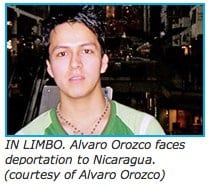Nicaragua’s plans to decriminalize gay sex next year won’t make a Nicaraguan refugee claimant any safer if he’s deported from Canada, says his lawyer.
Nicaragua announced changes to its penal code on Nov 13 and the revised code — scheduled to come into effect in March of next year — contains no mention of homosexuality. Sodomy has been illegal in Nicaragua since 1982.
But El-Farouk Khaki, the lawyer representing Nicaraguan refugee Alvaro Orozco, says the change in law won’t make it any safer for his client, especially as the media there has covered his refugee claim in Canada.
“I think he would still be at risk if he went back to Nicaragua,” says Khaki. “Remember he’s been outed in Nicaragua. The reality is that many queer people around the world still get persecuted in countries where homosexuality is not necessarily illegal. You have to take a look at societal attitudes and the police.”
Orozco was supposed to be deported from Canada on Oct 4, after the Immigration and Refugee Board (IRB) ruled against him in a preremoval risk assessment (PRRA) in September. He was originally turned down for refugee status in October of last year when an IRB member didn’t believe he’s gay.
Orozco says he fled an abusive and homophobic father at age 12 and made it to the US, working in construction from the age of 14 until he decided to move to Canada five years later.
Khaki says his client is in hiding pending the outcome of several appeals. Khaki is appealing both the original IRB ruling and the PRRA ruling. He has also launched a direct appeal to the minister of immigration through the office of Toronto MP Olivia Chow.
Khaki says he’s a little surprised that despite the publicity surrounding the case, the federal government has been silent.
“It really is the first time the government has taken such a hands-off attitude,” he says. “It’s indicative of their attitude towards immigrants and especially homosexuals.”
Khaki says the change in Nicaraguan law is a step forward.
“The rescinding of the antisodomy laws of Nicaragua is on one level a good thing,” he says, “but there are still questions about the level of protection. As far as future potential it’s a good thing,”
Khaki says there is a danger that the change in law could make it harder for a gay Nicaraguan refugee facing persecution to be accepted in Canada.
“It’ll depend on the board member,” he says. “The refugee board could conceivably say this repeal is an indication of things getting better.”
Toronto immigration lawyer Robert Blanshay, a specialist in refugee law, says legislative changes are meaningless by themselves.
“So Nicaragua passed a law,” he says. “Big deal. Nicaragua’s a very strong Catholic country. There’s a very strong culture of machismo. Does a law mean that people in the country and small towns will be acting differently? Are the police actually arresting people who are beating up and harassing gay people? The rule of law is not simply passing legislation and making speeches.”
Blanshay says refugee cases will come down to the claimant’s lawyer.
“It’s incumbent on the counsel to provide documentary evidence about what’s actually going on on the ground,” he says. “A good counsel will have to take the head of the judge and shove it into the mass of evidence.”
Marcelo Ernesto Ferreyra, the coordinator of the International Gay and Lesbian Human Rights Commission’s Latin American and Caribbean office, says the anti-sodomy law wasn’t strictly enforced. But he says the change in Nicaragua will send a positive message.
“There has not been an application of the law that has been clear. It was a kind of moral proclamation,” he says from his Buenos Aires office. “It was an example for society as to how they should think about homosexuality and about homosexual activism as well. From March, activists will have the opportunity to do much stronger work related to HIV and AIDS activism for example.”
Khaki agrees that the repeal of the law could make it somewhat easier for queers in Nicaragua to become more open.
“Antisodomy laws are usually used as a means of marginalizing the gay and lesbian population.”
But Ferreyra says while things are better in Nicaragua than in some other countries in the region he agrees with Khaki that there could still be strong homophobic attitudes in the country.
“There is a strong participation of the Catholic Church in the general political process,” he says.
Ferreyra adds that while there haven’t been many hate crimes reported in Nicaragua it doesn’t mean they don’t exist. He says that with the repeal of the antisodomy law more attention may be paid to such violent crimes.
“We think maybe they could be hidden,” he says. “With the law activists didn’t have their focus on keeping track of hate crimes. Maybe after the repeal of the law they can focus more on hate crimes.”


 Why you can trust Xtra
Why you can trust Xtra


